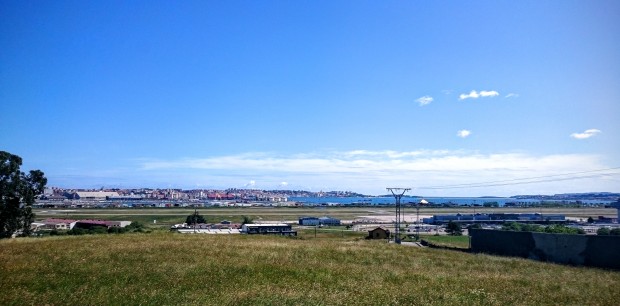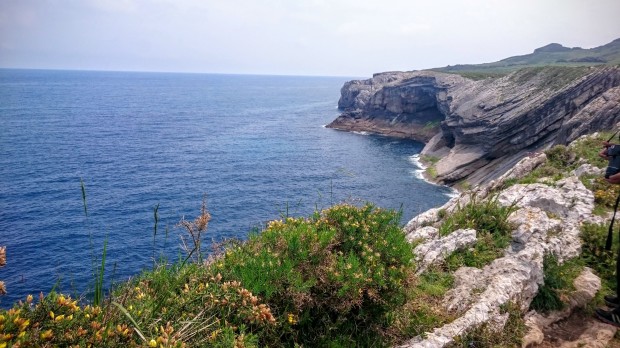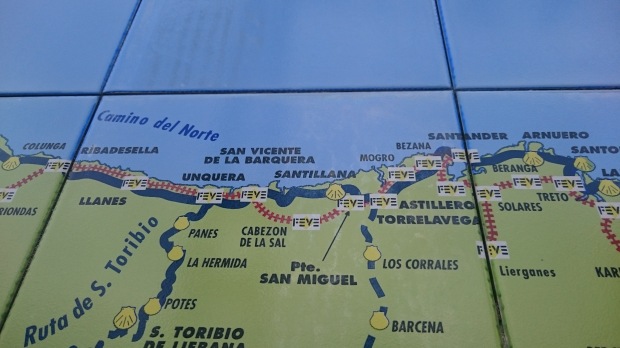It’s done, the thing is done! Four years of work compressed into a document just short of 250 pages. That is, until the…I hate to say the dreaded word…viva. There, I said it, to all of my dear friends who prematurely posted their obligatory Facebook post advertising their new addition to the library – we’re not quite done yet. But a significant milestone has been achieved and let’s face it, by next week, my eight-year run with the status “Student” will officially expire. To celebrate this occasion, I will not only share with you the picture of my “largest book I’ll ever write”, but my top five tips on how to get there.
- It’s never too early to start writing. I began my thesis by ‘copy and pasting” chunks of my first and second-year reports. Although by the end of it most of these things were totally remodelled, it was nice to make a start by saying you’ve got five pages ticked off already. One could easily start contributing to the methods chapter as they go along too. I started officially working on my thesis 12 months before the due date as I was actually hoping I could have it done and dusted months before the deadline. Unfortunately, circumstances didn’t allow that but it was pretty amazing to still be having some time off and fun in August when the rest of my year group were tearing their hair out in the company of their laptop.
- Write down EVERYTHING. This refers to your daily notes such as lab book notes. At the time you’re going to think such minor details are not necessary or you will remember these things anyway, but when the perfect antibody you are using stops working all of a sudden, you’re going to need all the lot numbers. Writing down exactly what things didn’t work is often more important than what did as this can be very helpful in troubleshooting.
- There is time to do things other than your PhD. Make the most of the fact you are still in uni. Join societies, get involved with the community, learn a new skill – if all you did was your PhD you won’t be very happy or develop transferable skills that will help you find a job later. It is also nice to use your PhD skills in other settings, e.g. teaching and tutoring pupils.
- Go to socials at your institute. Most institutes will have some form of social committees that will organise events to bring people in your own working environment together. Not only is this great to relax with the people you work with a realise everyone is just as normal (or abnormal) as you are, but meeting people who are in the same place as you can be advantageous for helping you to get friendly with people you might need advice from in the future – whether that’s career advice or help with a new experiment you have in minds
- Start thinking about your future now. You’re doing a PhD because you hope you will be able to get a better job afterwards. You might be certain you are going to be a professor or certain that you definitely don’t want to set foot in a university again or anything in between. Either way, there are plenty of careers fairs, exhibitions, competitions, workshops and internships that you can take part in to help you find where you belong.




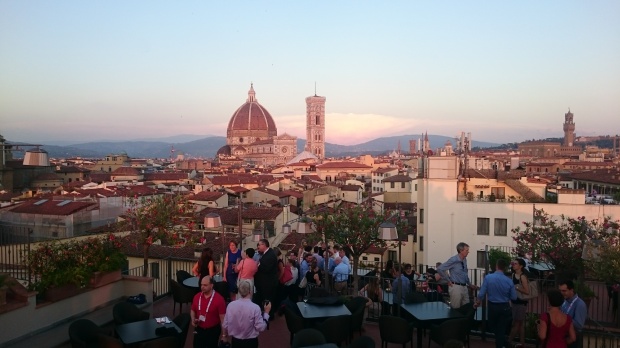









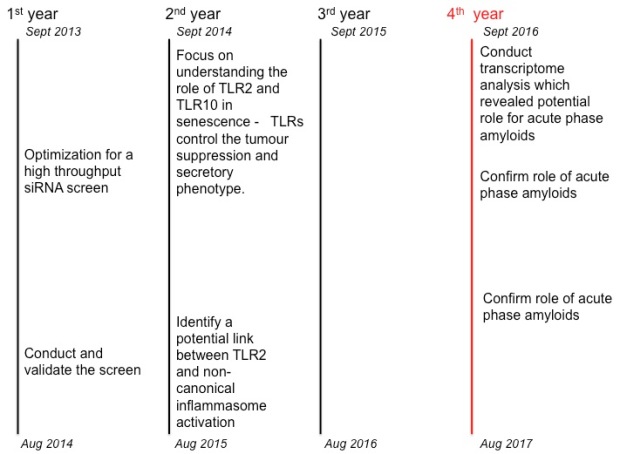


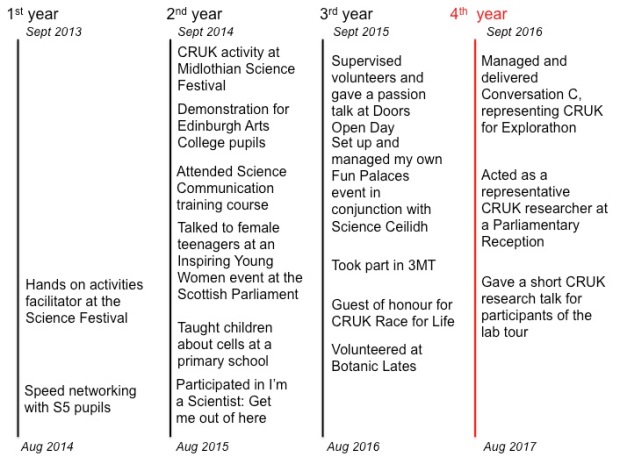











 day afternoon and then left to attend to my cells. Until my supervisor came running to find me, telling me that everyone was waiting for me in the seminar room. I didn’t dare hurry to find out who of the other 8 contestants had won but as soon as I entered the room, I was greeted my an overwhelming round of applause. I received a big check for £100 having won both the judges and audience votes. The whole thing was recorded and links are available through the university website but I still can’t bare to watch it. Little did I know that this was just the beginning.
day afternoon and then left to attend to my cells. Until my supervisor came running to find me, telling me that everyone was waiting for me in the seminar room. I didn’t dare hurry to find out who of the other 8 contestants had won but as soon as I entered the room, I was greeted my an overwhelming round of applause. I received a big check for £100 having won both the judges and audience votes. The whole thing was recorded and links are available through the university website but I still can’t bare to watch it. Little did I know that this was just the beginning.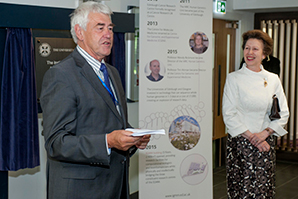 This meant that I was through to the University finals. But before that, just having been through these two rounds led me to gaining some recognition for my presenting skills. I was asked to attend the Race for Life in Edinburgh and gave a speech as a guest of honour to motivate the racers before their run, for which I was very grateful to be given the opportunity. I also got to start the race by sounding the horn (and also got almost trampled on by running enthusiasts!). As well as this, our institute (the Institute for Genetics and Molecular Medicine, IGMM) has recently has a new building built and an official opening was conducted recently by HRH Princess Royal, the Chancellor of Edinburgh University. I was given the opportunity here to present a poster to the guests of this event and even had the opportunity to meet and greet with HRH Princess Anne herself. This was such an honour too, another opportunity I may not have had if I hadn’t have taken part in the 3MT.
This meant that I was through to the University finals. But before that, just having been through these two rounds led me to gaining some recognition for my presenting skills. I was asked to attend the Race for Life in Edinburgh and gave a speech as a guest of honour to motivate the racers before their run, for which I was very grateful to be given the opportunity. I also got to start the race by sounding the horn (and also got almost trampled on by running enthusiasts!). As well as this, our institute (the Institute for Genetics and Molecular Medicine, IGMM) has recently has a new building built and an official opening was conducted recently by HRH Princess Royal, the Chancellor of Edinburgh University. I was given the opportunity here to present a poster to the guests of this event and even had the opportunity to meet and greet with HRH Princess Anne herself. This was such an honour too, another opportunity I may not have had if I hadn’t have taken part in the 3MT.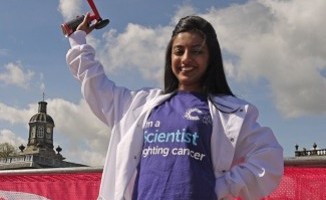
 competition, particularly as at least 3 of the contestants had to have been better than me as they would have come 1st in the college heats. But, I was only in it for the experience anyway. The final round is live streamed and first the first time, I really wanted my parents to watch me, hence I put as much effort into this, just to make them proud, regardless of the outcome. So, with a re-made slide and refined speech I happily gave my best shot at the finals and wished for the best person to win. I was gob-smacked when it was announced that I was 1st runner up again! With such good presentation from other contestants, I was not expecting to be the winner of an iPad. What I had also done, which meant more to me, was made my parents proud too, and even my supervisor said he was proud of me.
competition, particularly as at least 3 of the contestants had to have been better than me as they would have come 1st in the college heats. But, I was only in it for the experience anyway. The final round is live streamed and first the first time, I really wanted my parents to watch me, hence I put as much effort into this, just to make them proud, regardless of the outcome. So, with a re-made slide and refined speech I happily gave my best shot at the finals and wished for the best person to win. I was gob-smacked when it was announced that I was 1st runner up again! With such good presentation from other contestants, I was not expecting to be the winner of an iPad. What I had also done, which meant more to me, was made my parents proud too, and even my supervisor said he was proud of me.

